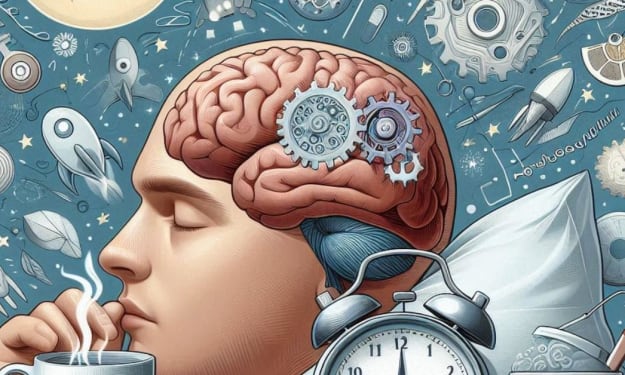Sweat for Smarts: How Exercise Boosts Your Brainpower
Get Moving, Get Thinking: How Exercise Boosts Brain Function

Introduction:
We all know exercise is good for our physical health, but did you know it can also significantly enhance your brainpower? Research consistently shows a strong link between physical activity and cognitive function. In simpler terms, getting your body moving can lead to a sharper mind, better memory, and improved overall brain health.
This article dives into the fascinating science behind exercise and brain function. We'll explore how physical activity benefits the brain, what types of exercise are most effective, and how to incorporate movement into your daily routine for a cognitive boost.
How Exercise Benefits the Brain
Exercise isn't just about burning calories and building muscle. It has a profound impact on the brain in several ways:
Increased Blood Flow: Physical activity gets your heart pumping, delivering more oxygen and nutrient-rich blood to the brain. This improved circulation fuels brain cells, enhances communication between neurons, and promotes overall brain health.
Neuroplasticity Boost: Exercise triggers a process called neuroplasticity, which allows the brain to form new neural connections and strengthen existing ones. This increased brain plasticity improves learning, memory, and cognitive flexibility.
Hippocampal Growth: The hippocampus is a key brain region involved in memory and learning. Studies show that regular exercise can increase the size of the hippocampus, potentially leading to improved memory function and a reduced risk of age-related cognitive decline.
Stress Reduction: Exercise is a powerful stress reliever. It helps lower cortisol levels, the stress hormone, and promotes the production of endorphins, which have mood-boosting effects. Reduced stress can significantly improve cognitive function and focus.
Neuroprotective Effects: Exercise may help protect brain cells from damage caused by free radicals and inflammation. This can be particularly beneficial for preventing neurodegenerative diseases like Alzheimer's and dementia.
Exercise for a Sharper Mind: Choosing the Right Activities
The good news is that most forms of exercise can benefit your brain. However, some activities seem to have a particularly potent effect on cognitive function:
Aerobic Exercise: Activities like brisk walking, running, swimming, cycling, and dancing are excellent for boosting blood flow to the brain and promoting neuroplasticity. Aim for at least 150 minutes of moderate-intensity aerobic exercise or 75 minutes of vigorous-intensity exercise per week.
Strength Training: Building muscle mass can also benefit cognitive function. Strength training exercises like weightlifting, resistance bands, and bodyweight exercises can improve memory, focus, and executive function.
High-Intensity Interval Training (HIIT): This type of workout involves alternating short bursts of intense exercise with periods of rest or low-intensity activity. Studies suggest HIIT can be effective in improving cognitive function, particularly in older adults.
Balance and Coordination Exercises: Activities like yoga, tai chi, and Pilates can improve balance, coordination, and spatial awareness. These exercises can also help to sharpen focus and concentration.
Brain-Training Activities: Combining physical activity with mentally stimulating tasks can provide an added cognitive boost. Consider activities like dancing, learning a new sport, or playing brain games while exercising.
Incorporating Exercise for Brainpower: Tips and Strategies
Here are some practical tips to integrate exercise into your daily routine for improved brain health:
Find Activities You Enjoy: The key to sticking with an exercise routine is choosing activities you find fun and engaging. Experiment with different types of exercise until you discover something you genuinely enjoy.
Start Small and Gradually Increase: Don't try to overhaul your entire lifestyle at once. Begin with short exercise sessions and gradually increase the duration and intensity as your fitness level improves.
Break Up Your Day with Movement: Sitting for extended periods can negatively impact brain function. Make it a habit to get up and move around every 30 minutes. Take the stairs instead of the elevator, go for a short walk during your lunch break, or do some stretches at your desk.
Make it Social: Exercising with a friend or joining a fitness class can add a social element to your workout routine, making it more enjoyable and motivating.
Track Your Progress: Monitoring your progress can be a great way to stay motivated. Use a fitness tracker, journal your workouts, or set achievable goals to celebrate your achievements.
Remember, consistency is key. Even small amounts of regular exercise can make a significant difference in your brain health. By incorporating physical activity into your daily routine, you can improve your memory, focus, cognitive function, and overall brainpower.
In Conclusion
#exercise #brainfitness #memoryboost #cognitivehealth #focus
About the Creator
ActiveVitaLife
Achieve your best you! Expert tips and easy strategies for all fitness levels. Reach your health goals with this blog, visit for more: (www.activevitalife.click)
Enjoyed the story? Support the Creator.
Subscribe for free to receive all their stories in your feed. You could also pledge your support or give them a one-off tip, letting them know you appreciate their work.






Comments
There are no comments for this story
Be the first to respond and start the conversation.